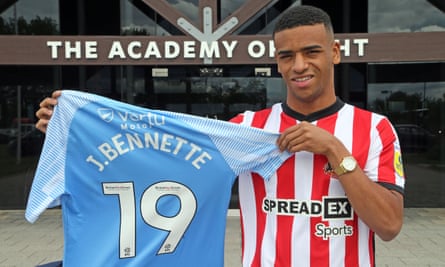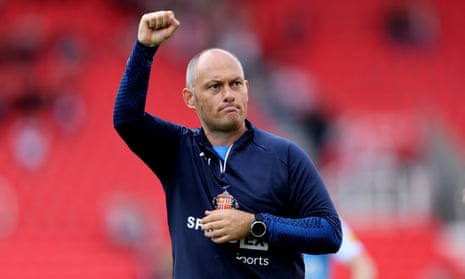A penny for the thoughts of Jewison Bennette last Friday morning. Almost certainly still jet-lagged following his 8,600km journey from Costa Rica to the north-east of England, the 18-year-old winger arrived at the Academy of Light training ground to meet his new teammates having signed a four-year contract to play for Sunderland the previous day. “When you see the Stadium of Light and this huge fanbase, it gives you more desire to work hard day-to-day and give your all,” he said after signing his contract.
Bennette’s new manager could scarcely have been more effusive in his praise of a player who became the youngest footballer to represent Costa Rica when he came on as a substitute against El Salvador a year ago, but he preached caution. “We need to be patient and allow him time to acclimatise to a new country and learn the language,” said Alex Neil. “He is certainly one for the future.”
While that may well be the case, one of Bennette’s first actions as a Sunderland player was to bid farewell to the man who had signed him less than 24 hours previously. In a turn of events that has all but cemented Sunderland’s status as the English league’s top “banter” club, the Netflix cameras returned to the Academy of Light on Friday morning to begin recording a third series of the acclaimed documentary series Sunderland ’Til I Die and we can but hope they were rolling as a reportedly emotional Neil told his shocked players he was abandoning them to go and manage Stoke.
While Bennette might be one for Sunderland’s future, it became abundantly clear the manager who had guided them back to the Championship after a four-year purgatory in League One definitely was not. Even Sunderland fans will come to see the funny side once their audible anger, made clear in no uncertain terms on Saturday during the defeat by Norwich City, subsides.
On a day when their upwardly mobile club splashed out a record fee on the new striker Alexander Isak, Newcastle fans were certainly in quite understandable paroxysms of mirth prompted by the latest setback to befall their bitter but increasingly insignificant rivals. If, as Jürgen Klopp recently suggested, the bad juju permeating Liverpool’s training ground is prompted by the presence of a witch, the Academy of Light must be occupied by an entire coven.
Only Sunderland could welcome the Netflix cameras behind the scenes for two seasons in which they secured back-to-back relegations, only for them to be conspicuously absent for the subsequent campaign in which they finally secured a promotion through the playoffs. Only Sunderland could authorise their return on the very day the club’s best manager in years dropped the bombshell that he was leaving to go manage a side that his team had beaten six days previously.
“Why is it never us?” a tearful Michelle Barraclough asked, as she watched jubilant Charlton fans celebrate their team’s late mugging of her beloved Black Cats in the League One playoff final in one of the more poignant scenes of the most recent series of Sunderland ’Til I Die. “Why is it always us?” she might well have asked on Friday morning.

Following years of boardroom buffoonery and often comically slapstick ownership in which a dozen full‑time or caretaker managers failed to get a tune out of often substandard or underperforming players, Barraclough and her fellow Sunderland fans could have been forgiven for thinking they had finally caught a long overdue break with the arrival of Neil last February. In fact they did, in so far as the Scot rallied and galvanised a flagging team to secure promotion to the Championship through the playoffs last season. However, his abrupt departure despite encouraging signs in the early stages of the season has once again threatened to plunge the club into crisis.
The reasons for what many see at best as a sideways step for Neil remain simultaneously clear and unclear. While we can only speculate on life behind the scenes at Sunderland, all available evidence suggests the club have distanced themselves from their days as arguably English football’s biggest lost cause. Neil had brought in seven players over the summer and was on the cusp of signing another promising teenager from Paris Saint‑Germain but had recently expressed frustration at his inability to bring in more new faces.
after newsletter promotion
“I can’t knock on the door any more – there’s probably no door there any more because I’ve pretty much bust it down,” he said. “Listen, we need to get reinforcements in, and we’re aware of that.”
Now that Neil has left to join a club that have been forced to wildly curtail their spending in the transfer market to fall into line with the English Football League’s financial fair play rules, the obvious conclusion to draw is that the main motivation for his move to what is arguably a smaller club is his own personal enrichment.
Emerging from his office, with its door splintered on the hinges, to speak to Sky Sports on Saturday, the Sunderland technical director, Kristjaan Speakman, revealed Neil was on a rolling contract, the terms of which had been significantly improved in the wake of Sunderland’s promotion. Speakman also said Neil had been offered even more generous terms as soon as the club hierarchy became aware of his and Stoke City’s mutual interest.
“Unfortunately it doesn’t appear that’s going to be enough for him to stay,” he said. Sunderland ’til I die, as the song from which the documentary takes its name goes. Or at least ’til I get a better offer from Stoke.

